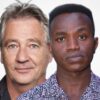destruction of Khartoum in recent days
The five month old war in Sudan is causing a “humanitarian emergency of epic proportions”, the UN warned last month. Hundreds of thousands of children are severely malnourished and will die if help does not arrive. Nearly one million citizens moved to neighboring countries and three million people were displaced within Sudan. And the number continues to increase daily.
Fighting between General Fattah al-Burhan’s regular army and the paramilitary units of militia leader Mohamed Hamdan Dagalo, also known as Hemedti, has reached a stalemate in the capital Khartoum. However, the quicksands of fighting are spreading to the central Kordofan region. And in the Western region of Darfur, large-scale ethnic cleansing continues to take place by Hemedti’s Rapid Support Forces (RSF) or by Arab militias affiliated with the RSF.
Hospitals, airports, museums, homes, ministries, laboratories, all types of infrastructure have been damaged and put out of order. Many farmers have abandoned their fields, although now is the time to sow as Sudanese citizens having virtually nowhere to turn for help, foreign aid is not available, or only in small amounts.
The only assistance a Sudanese can hope for is from emergency committees that were set up by civilians. These groups emerged from the Resistance Committees, which led the fight against military regimes. Initially, this happened during a short-lived and failed popular uprising against President Omar al-Bashir in 2013, culminating in the popular revolution of 2019. Since then, hundreds of such committees have been set up, not only in cities but also in small villages and suburbs.

Every day, Othman Ahmed (36) climbs a hill in Omdurman, the sister city of Khartoum. There he catches a signal for his telephone; most signal towers no longer work due to a lack of fuel. From the hill he says:
“From here I can coordinate the activities of our Emergency Committee. There are only a few of us left; most of the members have fled. We can’t do much, what we scrape together we divide it. People are dying of hunger because water pipes are bombed, food supplies are inaccessible and medical supplies are unavailable.” Many residents of Khartoum fled eastwards, to the agricultural region of Jazeera state or to the cities of Kassala and El-Gedaref.

Adam Ali (29) is a member of an Emergency Committee in El-Gedaref: “We receive about fifty families a day at the bus station. We buy food for them with our own money, because the government does almost nothing.” El-Gedaref is not in the war zone, the east is in the hands of General Burhan’s government army. “We investigated the relief supplies that the municipality had stored,” continues Othman Ahmed. “We discovered that only a quarter of relief supplies were distributed to the displaced.
The rest was sold on the market.” Burhan’s supporters are using the relatively safe area in the east to prepare a counter-offensive. The arms market near the borders with Ethiopia and Eritrea has been flourishing since the start of the war. “The government army is recruiting civilians, including children, on a large scale to fight”, says Adam Ali. In addition, the El-Gedaref authorities shelter radical Islamists. They formed the backbone of Bashir’s thirty-year regime, and also retained influence under Burhan afterwards. These radical Islamists, organized in the paramilitary brigade Katibat Albraa, are participating in this counter-offensive from Eastern Sudan. One of the most prominent fundamentalist leaders is Ahmed Haroum, who is wanted by the International Criminal Court in The Hague. Haroun escaped from prison in Khartoum at the outbreak of war and has since been seen in El-Gedaref.

Tarig Abdulrahman (25) recently fled Khartoum for the eastern Jazeera region. “Before I left my neighborhood, my brother was shot in the head by a female RSF sniper,” he says. The civilian activists no longer work as Resistance Committees, because they would then become a target of one of the generals. That’s why they call themselves Emergency Committees. Abdulrahman: “We provide health services and medicines to patients with chronic diseases such as diabetes, hypertension and asthma, especially among the elderly. Unfortunately, we cannot help with healing after rape. And rape happens very often in this conflict.”

Two months after the outbreak of war, several foreign aid groups had arrived in Eastern Sudan. They work directly with the citizens’ committees, to the annoyance of the authorities. Some foreign aid workers, while keeping their names strictly confidential, say that they distribute aid through civilian committees. These committees remain the only lifebuoy for the helpless population.
This article was first published in NRC on 4-9-2023

